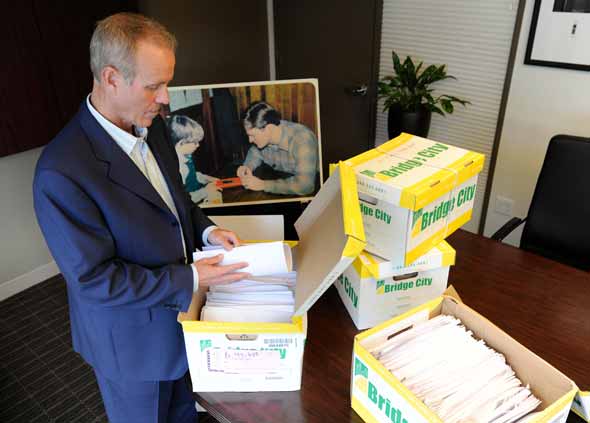THREE Area Cases Included Among Thousands in Boy Scouts" "Perversion Files"
By Don O'brien
Information about three cases concerning local Boy Scout leaders were among the 14,500 pages of secret "perversion files" released Thursday by order of the Oregon Supreme Court. The Associated Press reported an array of local authorities -- police chiefs, prosecutors, pastors and town Boy Scout leaders among them -- quietly shielded scoutmasters and others who allegedly molested children. The files document sex abuse allegations across the country, from a small town in the Adirondacks to downtown Los Angeles, from 1959 to 1985. The local cases involved a Memphis, Mo., minister in 1960, and incidents in the 1980s in both Quincy and Fort Madison, Iowa. ? Michael James LaRoche was a cubmaster for a Quincy in Quincy when the Quincy Police Department started an investigation on Jan. 8, 1985. LaRoche, 23 at the time, was convicted later that year of attempted indecent liberties with a child, a Class 2 felony, and was sentenced to four years in prison. He was placed in the Scouts' confidential file in January 1986. Click here to view documents related to the LaRoche case. ? The Rev. Dean Jones, a pastor at Christian Church in Memphis, Mo., was accused of oral sodomy in June 1960, according to papers filed by The Great Rivers Council of the Boy Scouts of America. The Boys Scouts' memo said Jones "failed to deny or admit (the charge) but immediately resigned his position in the church." Jones, 28 at the time, was the cubmaster for Pack 97 in Memphis. His file does not indicate if he was ever charged. The memo stated that "sufficient evidence has been collected to verify the major complaint." Click here to view documents related to the Jones case. ? Donald A. Swetnitk of Fort Madison was suspended from the Boy Scouts in May 1985. He pleaded no contest to a charge of indecent contact with a minor. According to paperwork filed by the Southeast Iowa Council of the Boy Scouts of America, Swetnik, 35 at the time, received a deferred judgement in the case. He received two years probation and had to participate in counseling. After completion, the record of the charge would be erased. Click here to view documents related to the Swetnitk case. Gary Mertz is Scout executive and CEO of the Mississippi Valley Council, which serves 3,500 scouts in the 12-county area. He said the Boy Scouts of America has put several safeguards in place to prevent problems. "All of our volunteers must complete a vigorous application and screening process before they can join the Scouts," Mertz said. "Applicants must provide references, and they have to submit to a national criminal background check." Mertz said two adult leaders must be in every group now, and no Scout is allowed to be left alone with a Scout leader. The release of the "perversion files" and the controversy surrounding it hasn't hurt local Scouting efforts, according to Mertz. "We just finished our fall recruitment, and we had a big increase of scouts," Mertz said. The three area cases were among thousands compiled. Portland (Ore.) attorney Kelly Clark blasted the Boy Scouts for their continuing legal battles to try to keep the full trove of files secret, according to the Associated Press. "You do not keep secrets hidden about dangers to children," Clark, who in 2010 won a landmark lawsuit against the Boy Scouts on behalf of a plaintiff who was molested by an assistant scoutmaster in the 1980s, said. The files were shown to a jury in a 2010 Oregon civil suit that the Scouts lost, and the Oregon Supreme Court ruled the files should be made public. After months of objections and redactions, the Scouts and Clark released them. The new files are a window to a much larger collection of documents the Boy Scouts of America began collecting soon after its founding in 1910. The files, kept at Boy Scout headquarters in Texas, consist of memos from local and national Scout executives, handwritten letters from victims and their parents and newspaper clippings about legal cases. The files contain details about proven molesters, but also unsubstantiated allegations. Many of the files released on Thursday have been written about before, but this is the first time the earliest ones have been put in the public domain. The 1959-85 files show that on many occasions the files succeeded in keeping pedophiles out of Scouting leadership positions -- the reason they were collected in the first place. But the files document some troubling patterns. In many instances -- more than a third, according to the Scouts' own count -- police weren't told about the alleged abuse, and there is little mention in the files of concern for the welfare of Scouts who were allegedly abused by their leaders. Numerous documents show compassion for suspected abusers, who were often times sent to psychiatrists or pastors to get help. The Associated Press contributed to this story. Contact: dobrien@whig.com/221-3370
|
.
Any original material on these pages is copyright © BishopAccountability.org 2004. Reproduce freely with attribution.
